When INFJs Get Angry – A Look at INFJ Rage
When you think of INFJs, one of the last things that will come to mind is someone tossing over tables and screaming at other people. We’re often described as sensitive and empathetic individuals with a keen eye on future possibilities – but, like everyone, we also have a dark side. And no, we don’t always manage our anger by door-slamming – although some do.
Not sure what your personality type is? Take our new personality questionnaire here. Or you can take the official MBTI® here.
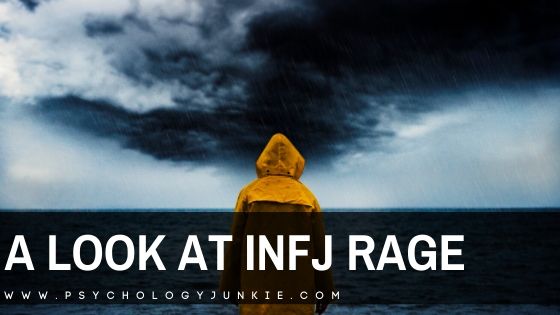
Table of contents
- The Kinds of Things That Make INFJs Angry:
- Here are some of the things that make INFJs the angriest:
- The Mental Mechanics of INFJ Anger
- Dominant Function: Introverted Intuition (Ni)
- Auxiliary Function: Extraverted Feeling (Fe)
- Tertiary Function: Introverted Thinking (Ti)
- Inferior Function: Extraverted Sensation (Se)
- What Do INFJs Do When They’re Angry?
- How to Help an INFJ Who Is Angry:
Estimated reading time: 10 minutes
The Kinds of Things That Make INFJs Angry:
INFJs tend to be patient. Before reacting to an offense we’re going to mull over it in our minds for a while to make sure we’re not being rash or impulsive. We’ll look for patterns, underlying meanings, and hidden agendas before we focus on our own subjective feelings regarding a situation. We’ll also analyze the logic of the situation. “Does it make sense that I’m angry?” “What are the facts?” “How do the patterns I’ve noticed fit together with what’s happening now?”
INFJs tend to get stuck in analysis-paralysis before they react to something. On the outside, they might appear unreadable or lost in thought, and when they finally have decided to express their anger, the situation might have deflated or passed them by.
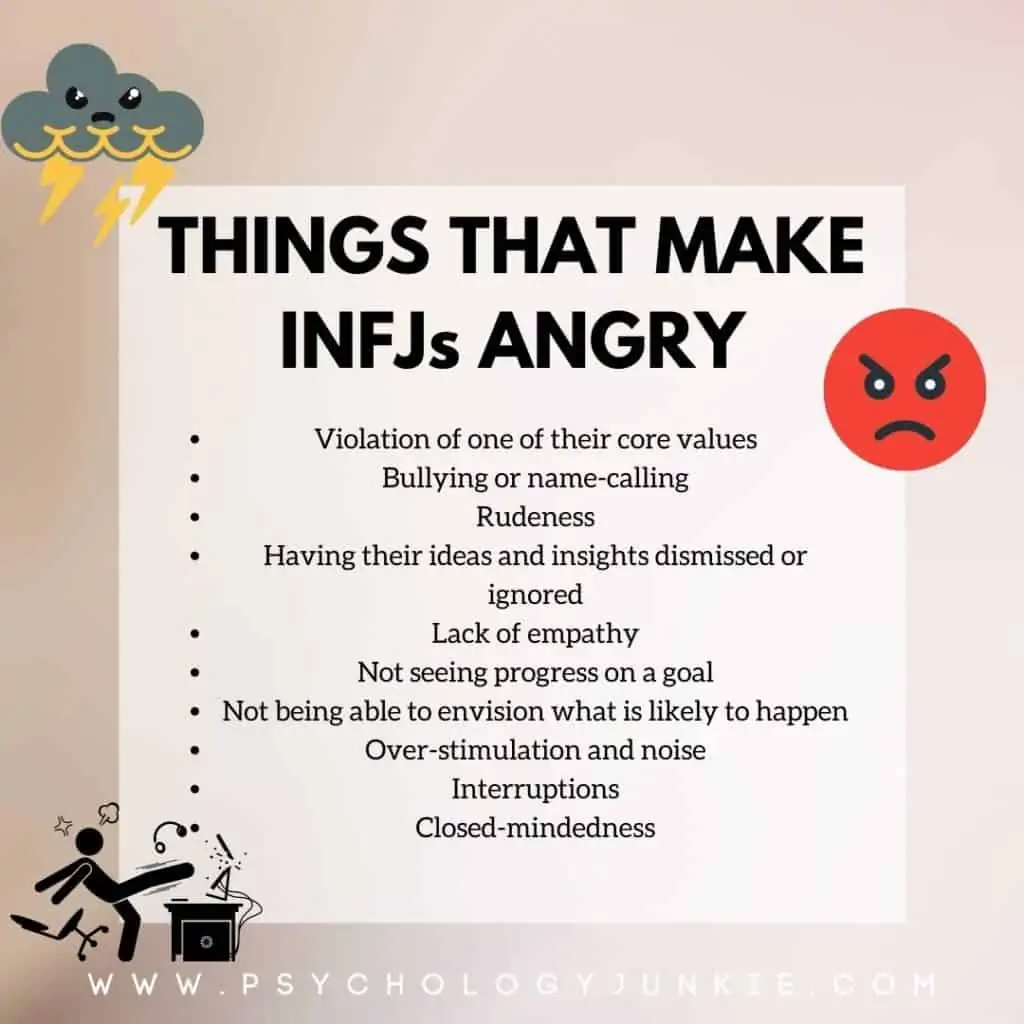
Here are some of the things that make INFJs the angriest:
- Violation of one of their core values
- Bullying or name-calling
- Rudeness
- Having their ideas and insights dismissed or ignored
- Lack of empathy
- Not seeing progress on a goal
- Not being able to envision what is likely to happen
- Over-stimulation and noise
- Interruptions
- Close-mindedness
The Mental Mechanics of INFJ Anger
Let’s take a look at the INFJ function stack and how that’s affected by anger-triggers.
Dominant Function: Introverted Intuition (Ni)
INFJs want to envision how things will unfold in the future. Their insight into future possibilities and implications can be transformative at best and uncanny at worst. Some people laugh off their premonitions, calling their insights “woo woo,” and teasing them. Unfortunately, this happens more often than not and leaves INFJs in a state of feeling that their greatest strength is nothing but a burden or a joke to most people.
When the Ni insights of the INFJ are ignored they tend to feel depressed and listless. They may feel that they can’t trust their intuition, which is a dangerous place for an INFJ to be. After all, this is the function that gets them into a state of flow and potentially can have the most power and benefit in their life.
INFJs who aren’t able to embrace and trust their intuition can become anxious, stressed, irritable, reactive, and depressed.
When INFJs become angry, their Ni will look for the pattern of their anger and the undercurrents of what led to the situation they’re facing.
Imagine that a friend betrays an INFJ’s trust by inadvertently spreading a rumor about them. The INFJ will tap into Ni to pull together any connections or patterns in the situation:
- Has the friend done this before?
- What does the friend have to gain?
- What underlying reason could the friend have to spread this rumor?
- What else is going on here that I might not be thinking of?
- What is the future implication of this rumor being spread?
- How does this matter in the grand scheme of things?
Ni is always trying to discern the big-picture, future implications, and underlying patterns. INFJs who are angered will tune into Ni to find out how the offense will play out in the long run and how it impacts the big picture of their life.
Auxiliary Function: Extraverted Feeling (Fe)
INFJs back-up their Ni with Fe. Fe is what helps INFJs to be attuned to the emotional wavelengths of the atmosphere they’re in. INFJs can easily detect other people’s moods, emotions, and needs. They also have a compulsion to take care of the emotional atmosphere and take care of people in an emotional and physical sense. At times they may trigger an emotional mood to catalyze a situation and create some kind of growth or impact.
Because INFJs are so naturally aware of harmony levels and emotional needs, they are irritated by people who seem tactless, rude, mean-spirited, troll-ish, or unnecessarily disruptive. In situations where someone is corrupting the emotional atmosphere for their own selfish gains, an INFJ can become severely angered.
For example, imagine that you’re at a family gathering, and one family member is mocking the religion or political opinions of another family member, thereby creating tension and discomfort. Extraverted feeling will be absorbing all the mixed emotions, sensing everyone’s discomfort, and feeling a compulsion to “fix” this situation. They may give the offending family member a gentle kick in the leg and a stern look as a warning to tone it down. If the situation worsens, they may abruptly call out the behavior, and if one of their core values is violated they may go so far as to get into a shouting match or charged state of aggression.
Tertiary Function: Introverted Thinking (Ti)
Introverted thinking sorts out the underlying logical framework of a problem. It finds logical relationships, inconsistencies, and checks to make sure things align with one’s logical principles. INFJs enjoy analyzing, categorizing, solving problems, and expressing their ideas clearly in writing. This function is one that INFJs tend to “play” with. They enjoy analyzing a problem or situation in their mind or writing down how they see it – but it’s a very deep, internalized process. It may not be very obvious to the outside world.
Because INFJ’s value Introverted Thinking, these things can make them angry:
- Logical inconsistencies
- Over-generalizations
- Faulty logical arguments
- Reactive angry or violent expressions that lack any inward analysis
When INFJs get angry, they’re likely to process their feelings through Introverted Thinking before expressing them out loud.
For example, imagine that you’re an INFJ and you’re angry because someone slacked off on a commitment and now you’re running late on a deadline for work. Using Introverted Thinking, you might:
- Assess the logical ways you could solve the problem.
- Try to create a logical, reasonable, precise argument that you can use to make the offending person aware of their mistake.
- Get stuck in analysis-paralysis, thinking of all the reasons why you might be right/wrong and he/she might be right/wrong.
Many times your cognitive functions work together. You might use intuition and thinking at the same time while expressing yourself through extraverted feeling. It can look something like this:
- Looking for patterns of poor behavior.
- Looking for the implications of this behavior.
- Logically analyzing the situation.
- Expressing yourself tactfully and trying to remain calm so as not to disrupt the emotional atmosphere.
- Trying to express reasonably why an offense is wrong, being very particular with your choice of words, and staying tuned into the emotional affect those words are having.
Inferior Function: Extraverted Sensation (Se)
Extraverted Sensation is the function that allows you to experience the world around you and act according to the immediate needs of the moment. Imagine you’re playing a game of tennis – Se is what helps you to stay zoned into the court, the ball, the racket in your hand, and respond to hit the ball at the right time and at the right angle. Se is keenly aware of details and facts and knows how to interact and engage with the environment in a resourceful way. Because this is the INFJ’s inferior function, it can be difficult for them to use well. We tend to always feel somewhat removed from our environment – lost in thoughts and insights, but somewhat blind to the fine details of what surrounds us. We might be absorbed by some meaningful, inner vision and walk into the corner of a doorframe because we’re so transfixed by what we’ve imagined and lost track of what’s outside of us. When people point out our weakness in this area it can make us feel ashamed or awkward.
Because we’re so inwardly focused and so transfixed by the intuitive, imaginative world inside, outside stimulation can feel overwhelming. We find loud noises, interruptions, and bright lights overwhelming, irritating, and distracting. We might react to such things with stress, confusion, and unexpected bouts of charged anger.
When INFJs are extremely stressed, they may “fall into the grip” of Extraverted Sensing. They become more impulsive, reactive, and obsessed with details and experiences. They might recklessly spend money, binge eat, exercise until they’re burned out, or clean every little thing in their house. Once blind to details and in tune with intuition, they now become hyper-focused on details and blind to their intuition. During these stages, they can seem brash, indulgent, and careless.
Grip stress is extremely unpleasant for INFJs. They feel like they’ve lost part of themselves – as if they’re having an out-of-body experience, or they can’t control their impulses. Because they’ve lost their vision and insight, they feel dragged around by their sensing side – distracted by all the details that never used to bother them. Little things make them angry, and they may feel themselves doing all kinds of indulgent things they know they’ll regret later (like eating an entire cake or ignoring homework to binge-watch an entire season of trashy TV).
Here are some tips for INFJs experiencing this kind of stress.
What Do INFJs Do When They’re Angry?
A lot of things can influence how an INFJ will express their anger. Usually, they will get more withdrawn and stuck in their head when they’re angry. They might try to shut off noise, lights, or find a room they can hide away in to deal with their thoughts and charged emotions. Some INFJs shut down and stop talking and reacting, trying to sort out their thoughts inside.
Some people can think that this behavior is passive-aggressive or that INFJs are giving them the “silent treatment.” However, this quiet stage is an INFJs way of sorting out the information through intuition and thinking without getting overwhelmed by the emotions of everyone else. It’s not always meant as a passive-aggressive instinct. If they aren’t given this opportunity to sort through their thoughts they might blow up, cry, or rush through their feelings only to regret it later. They may also put on a brave face and pretend that nothing is wrong because they don’t trust their own feelings without having the time to analyze them. It can be extremely difficult for them to deal with conflict because of the charged emotions flooding the atmosphere. They can get their own emotions mixed up with the emotions of other people and lose sight of the facts.
If INFJs are in a state of grip stress they can be more harsh, reactive, blunt, and critical than usual. They might tear down relationships, plans, or even physical objects around them in a state of self-destructive fury. Normally controlled, insightful, and internalized, they suddenly stop trying to cage their feelings in and just want to act on the rage and fire they feel pent-up inside.
How to Help an INFJ Who Is Angry:
- Reduce sensory stimulation. Turn off bright lights, turn down music, shut off the television.
- Give them some time alone to think and process emotions.
- Give them a break from non-essential responsibilities.
- Let them “vent” and promise that you won’t judge them.
- Buy a journal so that they can write down their thoughts.
- Follow through on your promises and commitments.
- Let them know what to expect.
- Be patient as they express their thoughts.
- Be calm and clear.
What Are Your Thoughts?
Do you have any insight or experiences to share? Let us know in the comments! We’d love to hear from you!
Find out more about your personality type in our eBooks, Discovering You: Unlocking the Power of Personality Type or The INFJ – Understanding the Mystic. You can also connect with me via Facebook, Instagram, or Twitter!
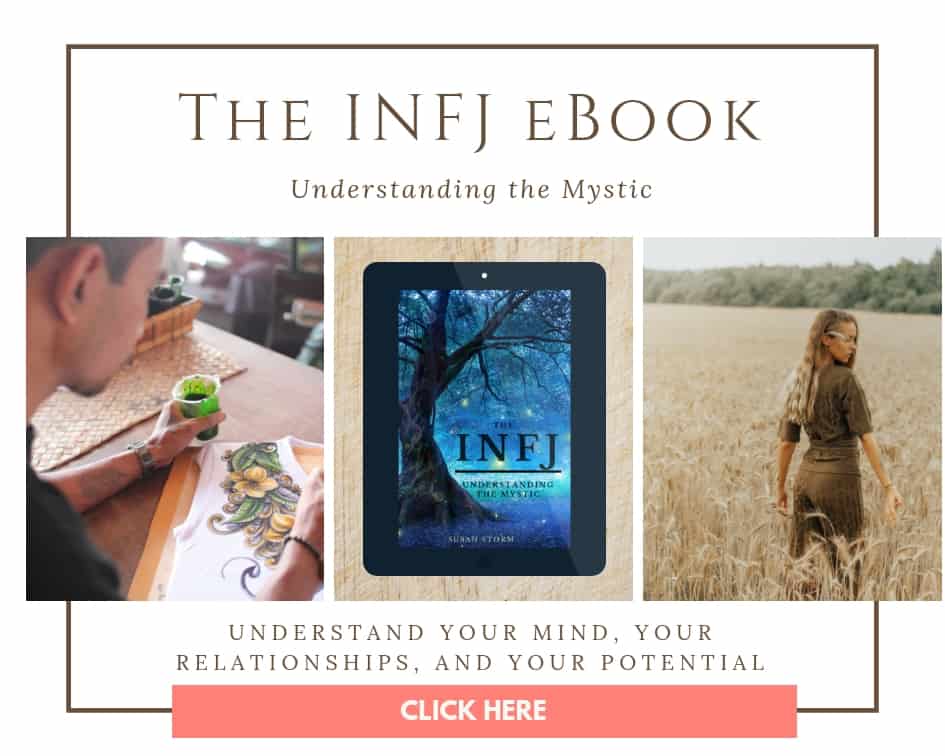

Get Your Free INFJ eBook
As a thank you for subscribing to my newsletter I will send you this free eBook PACKED with self-care tips, creativity hacks, and more! You'll also get a 3-day email course for understanding your personality type better!





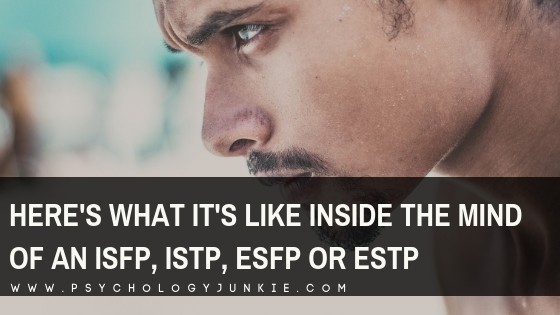


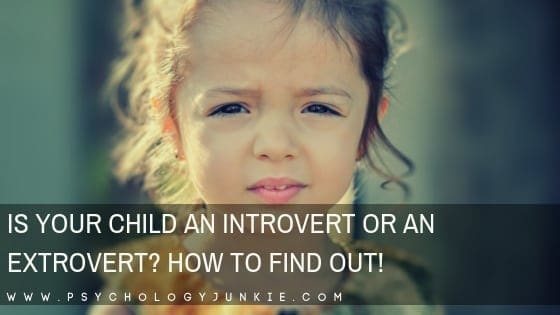


Wow. This is so incredibly spot-on, and so very helpful. I have never felt so understood. For a while I couldn’t decide whether I was an INFJ or an INFP, but reading your articles about INFJs — particularly this one — leaves no doubt that I am, indeed, an INFJ. Thank you so much!
Thank you Amy! I’m so glad that this was helpful!
This article was spot on. I’ve read several of your other articles on INFJ’s, and like someone else said, I feel so understood. Not only did I identify with everything here, but it was helpful to see suggestions on how to handle my anger! I can be more succinct in asking for what I need when I experience overwhelming Big Feelings. I am totally going to send this to my husband (and need to find similar article for his personality type too)!
As an INFJ right in the middle of an internal storm, this is really helpful; I can start to put down the idea that there’s something wrong with me! I do worry that I will damage relationships by saying what I am thinking, yet I know that keeping it all inside isn’t doing me any good. Alone time is the only real answer, I think – but until I can make that happen I shall continue to have the tidiest kitchen in Johannesburg.
Thanks, Susan. I hope you know how much your articles help.
Hey Susan, Really great insight. Definitely spot-on. I pride in the fact that I rarely get angry. But when I do, it’s all of the above. One other thing, unrelated, in an earlier article you mentioned an increase in the proportion of INFJs in the population – we are no longer the rarest type. I would seriously question that. Another INFJ got a (seemingly) ISTJ to do the test and the ISTJ thought she was INJF. I think it’s because people who are not like us what to be like us. 🙂 Ha ha ha … I think it could be a lack of self-awareness. So unless those statistics are confirmed by re-tests and impartial external observations, I wouldn’t take it too seriously.
i feel so understood. thank you helping me understand myself and provide insight on how to ease the anger i feel. this will help so much. thank you!
I’m so glad this was helpful Ella! Thank you for your input – it’s really good to know that the article is resonating with other INFJs like you 🙂
I never comment online, but I feel compelled. This is dead-on. It describes me perfectly.
Thank you so much Christine <3
Reading this resonated a lot with me, and understanding the process of anger for INFJs (which I had problems with decades ago) is like a salve that coats my old wounds and softens my scars, figuratively.
Thank you for sharing your insights, you are very valuable and helpful!
Excellent Work!
Thank you Darren!! 🙂
Usually I read and absorb and don’t want to bother by making unnecessary comments, but this is so dead spot on…like others said, I feel UNDERSTOOD! Yay!
The other thing that popped out at me is that the list of things that set us off is so descriptive of our current political picture in the USA…that I finally know why I have such a hard time during our election years, especially this one. The solution for me has been to engage delicately enough to figure out who to vote for and not watch too much, yet it felt like I was avoiding the whole situation, or that something was wrong with me that I was so triggered. I didn’t understand why so many other people seem to love to engage in this emotionally chaotic process. Now I get it! sigh of relief. Thanks. I ought to carry this around with me and read it often! I’m a put on a brave face and take on everyone’s emotions person…OMG.
This article is all about me, thanks for giving such helpful tips. I have a question though can you please write an article how an INFJ can deal with other “unhealthy” personalities? My husband is an unhealthy INTJ and we’ve been married for 11.5 years, you understand what that means. I just need help at times and if you can give some great tips it would be very much appreciated. Thank you Susan.
Dear Susan Storm, This article is very well written and insightful as usual. As a fellow INFJ I am not sure I can relate to it, though. I am an Enneagram 415 and patience and temper are two of my biggest weaknesses. I tend to be short tempered and impatient when things do not move forward like I would like to or anticipated. My patience with people who make errors in reason and logic is also a quite low. I can be very argumentative too. I question other’s motives and can be dismissive of not only their ideas, but the people behind these ideas as well. I try to keep my cool and remember the person behind the ideas and where they are coming from. We all have our own ways to deal with anger.
Finally I have discovered the true reason for not relating: I am an INTJ. I took me some time and a lot of self evaluation to figure this out. Thanks for your insights, Susan Storm!
This information is very important, but with all the flashing ads on the page are too distracting and I could not finish reading it. Well, no surprise that made me angry. Off for a walk in the woods. Great work though, Susan. I appreciate it!
Thanks Carly! I’m sorry the ads were so frustrating. I don’t insert the ads myself, I have an ad network that does this, but I’m going to see if we can remove some of them so it’s not so overwhelming.
My boyfriend is an INFJ and right now he’s in an unhealthy place where he’s over critical and quick to snap at me and then progressively make himself more and more mad until he’s full of rage aimed at me. I’m an ENFJ and I just don’t know how to help him because he belittles me and my ability to give him helpful advice. As I write this I’m thinking why am I staying in this abusive relationship? Well, the answer to that question is when he’s healthy he’s a much different person…and I want to do what I can, though I’m not sure what that.would be, to help him get back to a healthy mind state…any suggestions?
I completely agree about the ads. The article and points raised are really interesting, but seriously, get rid of the flickering shoe (I don’t want it!)…
great article! can you do the same for INFPs?
Definitely! Thanks for the suggestion 🙂
Helllooo Susan,
I reallllyyy love reading your vlogs
Your writing skills and your thought process is so indulging ????????????
Love you work! Is there any chance you might do more articles this in depth on the other personality types and anger? As an INFJ, I felt so validated with this one…I know my ENFP husband would love to learn more about his anger too!
Well said, Carly!
Love the information, can’t stand the blinking ads. So distracting and disruptive. This article on INFJ anger is full of insight and examples. Hope there’s a way to remove the silly distractions..
Susan, you are a blessing! Thanks for all the insights regarding INFJs. Always thought I was crazy until I found out I’m an INFJ. Hell, my mother thought I should have been committed as a baby. Glad I’m not crazy,although I am touched.????
Thank you for writing so clearly! The hardest part of my personality to understand is Se. I see jokes about it all the time but this made more sense. From what I understood, We react on our rage without the filter…I can honestly say, all my good qualities turn into weapons. This is why my husband calls me his katana. LOL! I die and he loves it. (ISTP)
When I’m really angry, I’m in “Hulk Mode” and holy shit, its downright psychopatic and I scare the shit out of people 😀
I can relate with that. And because of the INFJ insight and the amount of data I’m always absorbing by simply being around people, I precisely know their sorest spot to hit when I get angry. Of course the remorse I feel after is as excruciating.
This is so accurate! Glad you mentioned about loud noises and overstimulation. That alone sends me into a rage even when I cope with the other more “valid” reasons of anger by only withdrawing in my Ni and Ti. It confuses people around me because I’m often calm in more serious crisis situations but something as little as the music being a tad too loud makes me explode.
It’s like the more I’m trying to understand myself, the more i dont know about me. But this article really hit the point. I can relate myself.
This is so true
This actually really helped me to understand myself more. It’s funny you think you know yourself, but having something you do written down on paper so matter of factly is so helpful. Everything in here was so true… for me loud sound and noises really bother me and having someone not give me the time to process my emotions can be beyond frustrating. Thank you again for this article <3
Can an INFJ be reffered to as a phlegmatic-melancholic temperaments
I wonder if INFJs tend to be more melancholic than phlegmatic. That, at least, has been my experience. I’m an INFJ with a melancholic-choleric temperament. Many of my INFJ friends tend most toward a melancholic temperament, but this could also just be me seeking out others who better understand me.
This article really hit home. I have learned to create withdrawal phases for myself but it’s inevitable sometimes and I try desperately hard to put a brave face on when things become chaotic, and it works! Because only I know how turbulent my insides are… But thank you sooo soo much for sharing these. At least I know that it’s not unnatural
Very well written article. As an ESTJ with a INFJ family member, the points mentioned were very well presented. Grip stress can truly induce an INFJ to act out of their normal self – something I’ve personally seen. When they find themselves in the throes of this situation they do tend to lash out and become hypersensitive to stimuli. Thank you for your points on how to handle that particular situation with them.
What an interesting parallel! My long time partner is more than likely ESTJ (I believe), while I am INFJ. I’m really glad to know you took the time to learn about your INFJ loved one. Cheers to you
You definitely nailed it ! Wow ! Thanks so much for explaining it. I appreciate your help expressing how I truly feel.
This article was so on point. As I was reading this article, I kept thinking this is very accurate description of me. Thank you for the article, it does help to read that there are others like me out there.
Strikingly accurate! It is nice to feel understood, especially about these more complex matters. I feel confident to say that knowing and being an INFJ type is a rare gift (I have been told), yet we’re also quite complicated creatures and humans to behold 🙂
Stop writing about me 😅
It should also be mentioned that when INFJ (or the other Ni dom, INTJ) does express anger, nooone wants to be around.
All I can say is wow, how accurate this was! Thank you for helping me to see myself and understand that I’m not alone in my behaviour & in the way I feel. It also made me realise that I need to work on myself, my expressions and reactions to things when I am angry. I either shut down or melt down and both are not very productive ways of dealing with things. Thank you for this article x
Wow! Just wow! This is so totally ME! I feel like all my inward thoughts and feeling have been brought out here now, and I didn’t even wrote this article!
I am an INFJ. I hate bright lights and noises that are even just a tad louder than I want. I’m often turning volume down and have dim lights in my house (my sister likes bright lights and I often complain about them when at her house, I’m also always telling her kids to be quite or go outside to yell).
The list of things that make infjs angry is so perfect. I recently had someone question my morals and it made me so angry, I reacted in all the ways this article states we do! I still think about it off and on and get very upset. Nobody would want to be around when I’m upset. I rant and rave and sometimes even throw things (though very rare).
This was so a description of me!
Very accurate, I wish more people could read this…
My personality always comes out borderline INFP with a very low P%. However, I identify mostly with INFJ traits.
I used to be a very angry kid, but as I got older, I rarely got mad. Now, if I get mad, I don’t really show it.
The following may or may not be an INFJ trait. The one thing that stops me is, it makes me mad that I can’t justify being mad at the person! I find that I understand everyone, and thus I can look at the situation from their perspective. As a result, I empathize with them instead of feeling mad! Sometimes it feels like it would be nice to just be mad anyway.
But if that isn’t reason enough…
* As an INFJ, if I did get mad I’d feel like a hypocrite—I’ve likely been in their shoes before.
* As an INFJ, I am trying to please everyone and maintain a balance in the group.
* As an INFJ I’d rather sacrifice myself than the other person.
😝
I totally relate! I am using that ability to empathize to throw in a “directive” in my response.
So true, as an IFNJ, I don’t like bright lights too, I get angered by little things.
And I hate noise. It’s very easy for me to show my temper to people who try to hurt the people I care about. That’s more like my weakness. I don’t have control on this, if you hurt my people , I don’t care how big you are. I will react
But if it’s my people, I take very long to react and may not even show.